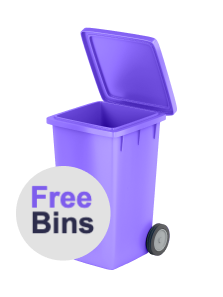There are more than 350,000 homes and 100,000 businesses in Leeds. Each one creates all sorts of waste, from daily domestic rubbish thrown in black wheelie bins at home to food waste disposed of by the hundreds of restaurants across the city. But what happens to all this waste once the bins are collected?
The domestic recycling rate in Leeds is around 39%, which is below the UK average of about 44%. However, that has still doubled in almost 20 years since 2006, when Leeds City Council set out its waste strategy with the aim of becoming carbon neutral by 2030. Yet it means over half of all domestic waste isn’t recycled in Leeds.
Changes and improvements are ongoing to the waste landscape across West Yorkshire’s biggest city. Find out what happens to waste in Leeds after it’s removed from your household or business to understand where it goes and how it’s processed.

What happens to
household waste in Leeds?
All households in Leeds should have a black bin for general waste and a green wheelie bin for mixed recycling (paper, cardboard, plastic, metal, and glass). Some homes also have a brown bin for garden waste. Much of the city has weekly black bin collections, fortnightly green bin collections, and seasonal brown bin collections.
Leeds City Council manages household waste in the city and works with various suppliers. What happens to household waste in Leeds depends on the type of rubbish and which bin it’s thrown away in:
General waste
Most general waste emptied from household black bins in Leeds is taken to the Recycling and Energy Recovery Facility (RERF) at Cross Green. This facility was formally opened in late 2016 and can handle around 214,000 tonnes of residual waste collected from homes across Leeds per year.
The general waste is sorted, with any recyclable metals removed. Waste is then incinerated at temperatures greater than 850°C, which generates electricity to supply the National Grid. It’s estimated to be enough to power about 22,000 homes, while the steam created is harnessed for the District Heating Network to supply energy to Leeds homes and businesses.
The introduction and use of the RERF in Leeds means the city now sends less than 3% of household waste to landfill. All black bin waste collected from Leeds homes should be processed at the RERF.

Household recycling
Most domestic recycling placed in green household wheelie bins in Leeds is transported to the Leeds Materials Recycling Facility (MRF) operated by HW Martin. Mixed dry recyclable waste materials like paper, cardboard, plastics, metals, and glass are processed and sorted before being sent to recycling facilities to prepare them for manufacture.
The MRF formally opened in summer 2007 and can handle 80,000 tonnes of dry mixed recycling every year. Recyclable materials pass through state-of-the-art sorting technology and are separated into their individual streams. Then they’re baled or segregated into loose loads and transported to factories and specialist facilities to create materials ready for the manufacturing sector.
Paper is pulped and turned into fresh rolls, while aluminium cans are melted and reformed into ingots, for example. There’s a separate plastic sorting facility that segregates different polymer types too, before flaking and washing them and then delivering to plastic product manufacturers. Glass is also cleaned, graded, and crushed to create two size grades of glass cullet.
Garden waste
Around 200,000 homes in Leeds have a brown bin for garden waste, which is normally collected from late March until late November. It’s estimated that more than 30,000 tonnes of domestic garden waste are collected from Leeds homes every year.
This garden waste is taken to various local composting sites across Leeds and the wider Yorkshire region. It breaks down naturally with the compost used for farming, gardening, and land restoration work in Leeds and the surrounding areas.
What happens to commercial
waste in Leeds?
Businesses must arrange commercial waste collection in Leeds by licensed waste carriers. Leeds City Council does not offer free collection for trade waste. Only two HWRCs in Leeds accept commercial waste, but you can only transport it to either site if you hold a waste carrier’s licence:
- Kirkstall HWRC – Evanston Avenue, Kirkstall, Leeds, LS4 2HR
- Seacroft HWRC – Limewood Road, Seacroft, Leeds, LS14 1LU
What happens to commercial waste in Leeds depends on the specific materials and the waste management company your business uses. At Divert, we divert all waste away from landfill in Leeds. The likes of glass, paper, cardboard, and metal are taken to MRFs and recycling facilities.
Food waste may go to an industrial composting site or anaerobic digestion plant, while general waste can be transported to an energy from waste (EfW) facility. These options help keep commercial waste produced by businesses across Leeds out of landfill and improve the city’s sustainability.

Explore our Leeds waste services
Divert is a dependable waste management provider in Leeds. We provide free bins to businesses across the city to separate waste materials. There are no delivery or rental fees for the bins – you just pay for collection. All drivers are licensed waste carriers, so you can enjoy peace of mind that your commercial rubbish is managed responsibly.
We divert all waste away from landfill to protect the environment, save you money on landfill tax, and recycle as much as possible. Our commercial waste services in Leeds include:
